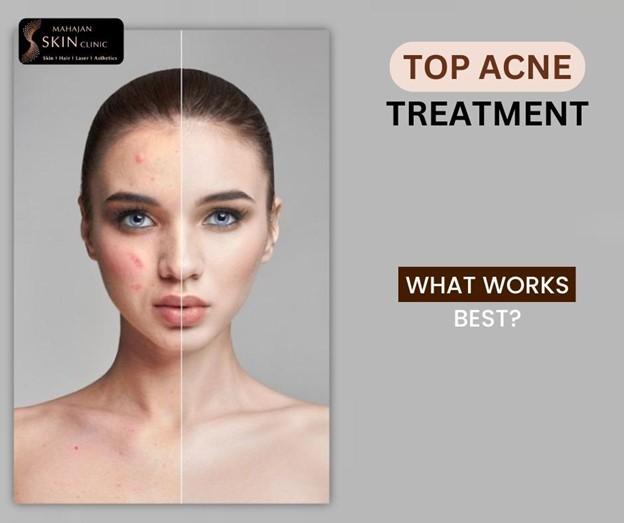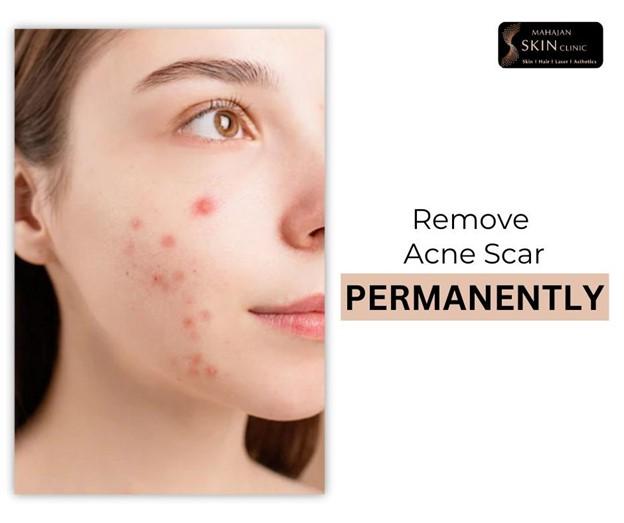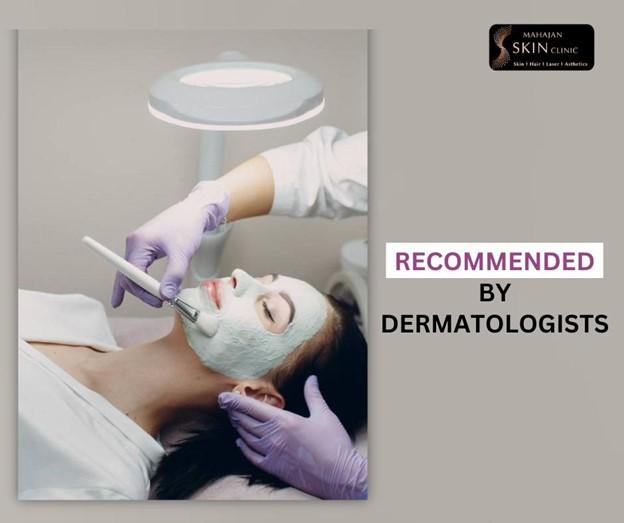Millions of individuals worldwide suffer from acne, a skin ailment that is widespread and sometimes uncomfortable. Because every patient’s situation is different and there are many alternatives available, finding an appropriate therapy can be difficult. Based on their knowledge of the most recent research and their skills, dermatologists are essential in advising and administering therapies for acne. The best acne remedies as advised by dermatologists will be covered in detail in this thorough guide, which also has commentary from prominent dermatologist Dr. Devinder Mohan Mahajan.

Reasons for Acne
Before beginning any treatment, it’s critical to comprehend the main reasons for acne. Hair follicles blocked with dead skin cells and oil (sebum) cause acne. As a result, whiteheads, blackheads, and pimples appear. The following are important variables that lead to acne:
1. Excess Sebum Production: The sebaceous glands’ overproduction of oil can clog pores and aggravate acne.
2. Bacterial Infection: Inflammation and acne lesions are caused by the bacteria Propionibacterium acnes (P. acnes), which grows well in obstructed pores.
3. Hormonal Changes: By causing an increase in oil production, hormonal fluctuations, especially during puberty, menstruation, or pregnancy, can cause acne.
4. Diet and Lifestyle: Stress, sleep deprivation, and certain meals might make acne worse for some people.
5. Genetics: The chance of having acne is increased in families where the problem has a history.
6. Environmental Factors: The development of acne may be influenced by pollution, humidity, and exposure to certain chemicals.
Retinoids topically
One of the best acne treatments is topical retinoid therapy. They function by decreasing inflammation, avoiding blocked pores, and encouraging cell turnover. Adapalene, tazarotene, and tretinoin are examples of common retinoids. These therapies are frequently suggested by dermatologists since they may cure acne as well as its scars.
Tretinoin: Tretinoin is a vitamin A derivative that has long been used to treat acne. It lessens the development of new acne lesions and aids in pore cleaning.
Adapalene: Often seen as less irritating than tretinoin, Adapalene is a more modern retinoid with a comparable mode of action.
Tazarotene: This alternative remedy is well-known for its strength. When other retinoids have proven unsuccessful, it is frequently utilized.
Topical Antibiotics
Antibiotics used topically are used to lessen the bacterial aspect of acne. They function by lowering inflammation and the quantity of germs that cause acne on the skin.
Clindamycin: A common topical antibiotic used to treat acne is clindamycin. To increase its effectiveness, it is frequently coupled with other therapies, such as benzoyl peroxide.
Erythromycin: Another antibiotic used to treat acne is erythromycin. Despite being less prevalent in usage these days due to the growth in antibiotic resistance, certain patients still have access to it.
Antibiotics Taken Orally
For moderate to severe acne, especially when topical therapies have failed, oral antibiotics are given. These drugs suppress germs and inflammation throughout the body.
Doxycycline: Oral antibiotics recommended for acne frequently contain doxycycline. It lessens bacterial growth and irritation.
Minocycline is an additional potent oral antibiotic. It is frequently utilized when doxycycline is not appropriate.
Benzoyl Enzyme
Benzoyl peroxide is a potent acne therapy that reduces inflammation and kills germs that cause acne. It comes in a range of forms, including washes, gels, and creams.
Mechanism: By adding oxygen to the pores, benzoyl peroxide prevents the anaerobic bacteria that cause acne from growing.
Usage: To increase its efficacy, it is frequently used with other therapies such as topical retinoids or antibiotics.

Acid Salicylic
A beta-hydroxy acid (BHA) that helps clear clogged pores and exfoliate skin is salicylic acid. In over-the-counter acne treatments, it is frequently utilized.
Mechanism: Salicylic acid dissolves dead skin cells that cause acne by penetrating the pores.
Use: It comes in a range of formulas, such as spot treatments, toners, and cleansers.
Hormonal Therapy
For women whose acne is impacted by hormonal swings, including premenstrual acne, hormonal therapies are very beneficial.
Oral Contraceptives: The FDA has approved the use of several birth control tablets to treat acne. They function by controlling hormones that may be the cause of acne.
Spironolactone: Spironolactone is an androgen receptor blocker that lowers sebum (oil) production, which is a factor in acne.
Isotretinoin
Strong oral drug isotretinoin, also known by its brand name Accutane, is prescribed for severe acne that is not improving with previous treatments. It functions by lessening sebum production, avoiding blocked pores, and shrinking the size and activity of sebaceous (oil) glands.
Effectiveness: Although quite effective, isotretinoin has some possible negative effects, including as dryness, sensitivity to sunlight, and in rare instances, more significant concerns.
Monitoring: Patients using isotretinoin need to have their dermatologist closely monitor them due to possible adverse effects.
Chemical Peels
In a chemical peel, dead skin cells are removed from the skin by exfoliating it with a chemical solution. This may lessen acne lesions and clear clogged pores.
Types: Salicylic acid and glycolic acid chemical peels are frequently used to treat acne.
Benefits: Chemical peels help lessen the visibility of acne scars and enhance the texture of the skin.
Laser and Light Therapy
Different light wavelengths are used in light and laser therapy to target acne lesions and decrease inflammation. Patients with moderate to severe acne may benefit from these therapies.
Blue light therapy: Attacks the acne-causing microorganisms.
Red light therapy: Encourages healing and lowers inflammation.
Dermatologist Dr. Devinder Mohan Mahajan: A Pioneer
Based in New Delhi, India, Dr. Devinder Mohan Mahajan is a highly esteemed dermatologist and senior skin and cosmetic surgeon. Dr. Mahajan is a dermatologist with over 35 years of expertise. He is renowned for his creative methods and dedication to patient care.
Concerning Dr. Mahajan:
Qualifications: The esteemed Maulana Azad Medical College in New Delhi is where Dr. Mahajan obtained his MD degree. His vast education and work history have made him a preeminent dermatological specialist.
Professional Leadership: His election to the Indian Association of Dermatologists, Venereologists, and Leprologists (IADVL)’s youngest president in 1997 attested to his ability to lead and his knowledge of the industry.
Practice: Dr. Mahajan works at Apollo Hospital in New Delhi and is the founder and CEO of SkinPlus clinics. His method blends cutting-edge medical science with kind patient care.
Research & Innovation: Dr. Mahajan is dedicated to being at the forefront of developments in skin and hair treatments, having been a pioneering dermatological researcher. His approach is outcome-driven and customized, which defines his profession.
Dr. Mahajan’s practice demonstrates his commitment to providing the best possible care. He and his staff are always learning new skills and methods to provide the most advanced and efficient treatments possible. Dr. Mahajan’s emphasis on providing specialized care guarantees that every patient receives a customized treatment plan that addresses their unique needs, regardless of the skin conditions they may be experiencing.
Professional Acne Management at the Clinic of Dr. Mahajan
Patients at Dr. Mahajan’s SkinPlus clinics get expert, cutting-edge acne treatments customized to meet their specific needs. The clinic provides a variety of services, such as:
Advanced Topical and Oral Medications: Tailored regimens utilizing the most recent hormonal treatments, antibiotics, and retinoids.
Professional-grade chemical peels and laser therapy are available to effectively control acne and reduce scarring.
Tailored Care: To guarantee the best outcomes for every patient, Dr. Mahajan’s staff offers tailored care and treatment regimens.

How to Take Care of Acne
Apart from seeking expert assistance, adhering to a suitable skincare regimen and modifying one’s lifestyle may greatly enhance the control of acne. Here are a few crucial pointers:
Cleanse Frequently: To get rid of extra oil, debris, and makeup, use a mild cleanser twice a day.
Refrain from Over-Cleansing: Excessive face-washing can deplete the skin of its natural oils, which can exacerbate acne and cause the skin to produce more oil.
Employ Non-Comedogenic Substances: Opt for “non-comedogenic” skincare and cosmetics products to prevent pore blockage.
Keep Yourself Hydrated: Drinking lots of water promotes good skin and aids in the removal of toxins.
Refrain from Touching Your Face: Touching your face can spread oil and germs from your hands, which can cause more breakouts.
Keep Up a Healthy Diet: To promote skin health, including foods high in antioxidants, vitamins, and minerals.
Conclusion
There are several solutions available to address different kinds and severities of acne, making acne therapy a multidimensional discipline. Dermatologists prescribe a variety of medicines, ranging from oral drugs and sophisticated therapies to topical retinoids and antibiotics. Dr. Devinder Mohan Mahajan provides a plethora of knowledge and creativity in dermatology for people looking for professional guidance and individualized treatment. His dedication to remaining current with new developments guarantees that patients get the best care possible. A dermatologist like Dr. Mahajan can offer you the advice and care you need to attain clear, healthy skin if you are dealing with acne or are looking for advanced dermatological treatments.
FAQs
In Delhi, effective acne treatments include laser therapy (such as fractional laser and blue light therapy), chemical peels, microdermabrasion, and topical or oral medications. Advanced clinics often offer personalized treatments combining these methods to address various acne types and severities.
To find the best clinic, research reputable facilities, read patient reviews, and consider the qualifications and experience of the dermatologists. Look for clinics with a proven track record of successful acne treatments and those offering personalized care and a range of advanced therapies.
Yes, many acne treatments in Delhi are designed to be suitable for different skin types, including sensitive skin. Dermatologists assess your skin type and acne condition to tailor treatments that minimize risks and maximize effectiveness.
Results vary by treatment and individual skin response. Generally, improvements may be visible within 4-8 weeks of starting treatment, but full results could take several months. Consistent treatment and adherence to the dermatologist’s advice are key to achieving the best outcomes.
